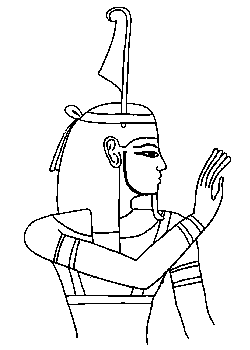
Shu is the god of air and wind; his actions were experienced in the hot desert air but also in the fresh wind that cooled both men and animals.
We don't know exactly what his name means; it is possible that it should be read as 'he who rises up', but it could also be derived from a verb meaning 'to be empty'. Shu is usually depicted as a man with a feather on his head; the hieroglyphic sign used to write his name.
Shu is one of the gods in the Heliopolitan Ennead. Creation began with the coming into existence of Shu and his sister Tefnut - the male-female polarity was created out of the androgynous primeval god Atum. According to one version of the Heliopolitan creation story, Shu was created by Atum's exhalation; this is why he is linked with the breath of life and could be regarded as the principle of life itself. The children of Shu and Tefnut are Geb and Nut, and it was Shu's task to support Nut and keep heaven and earth separated. Thus Shu is the divine power that created the living space within which creation could unfold.
Shu's association with the sunlight that permeates the Egyptian air led to a connection with the sun god Re. Just like the sun's rays, he is a visible image of the sun god. As a result, Shu escaped persecution during the reign of Akhenaton, he was regarded as sojourning in the sun's disk. Shu was later also connected with the moon; as such he lit the path through the underworld for the deceased and the gods.
Although Shu is mentioned in the Pyramid Texts and plays an important role in the Coffin Texts, he is hardly mentioned elsewhere before the New Kingdom. His rise in the New Kingdom is probably due to his association with the principle of life, which played a central role in the theology of this period.